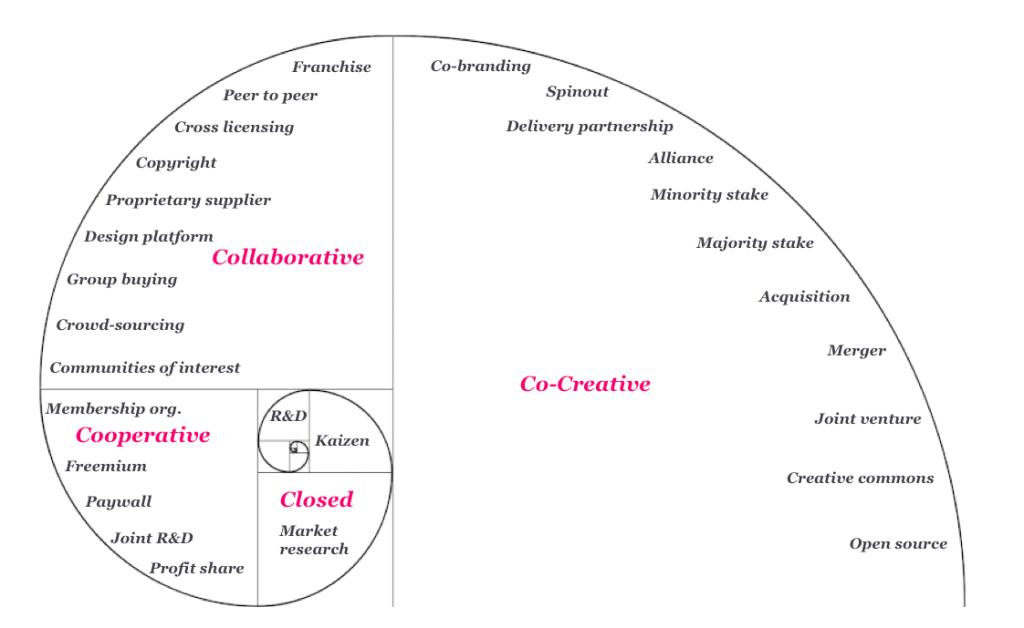IP = Intellectual Paranoia
There are two schools of thought on whether Intellectual Property helps or hinders innovation.
The traditional argument is that the ability to own the rights to an invention ensures that your years of hard work generate some payback. It’s hard to see big pharma companies ever abandoning this model for example if they stick to their current blockbuster-based business model. It’s also hard to see the likes of James Dyson or Apple giving up on their closed and secretive ways of working. But how curious that 21st century businesses like these are stuck in an 18th century paradigm. So is IP just intellectual paranoia?
(photo credit to blather.net)The counter-argument is that most innovation is collaborative by nature and that therefore secrecy and isolation hinder product and service development. Furthermore, an open approach to ownership is often likely to help embed and rapidly spread a new product. This is why Hoovers will never be called Dysons or PCs Macs. The case of how Microsoft’s operating system grew to dominate the world is moot. Apple protected theirs jealously and became a niche player in the computer market as a result. (Quite a successful game of catch-up ever since of course!) Nevertheless the sight of Apple and Samsung suing each other over tiny product features is undignified and makes me, for one, a little less fond of both brands.
So where does 100%Open stand? We believe that innovation isn’t just about IP. It’s about generating value for those who invent and commercialise new products. This is important because the sole reliance on IP (and its retinue of self-interested and expensive consultants) can get in the way. Consider P&G who are committed to open innovation. Even they won’t have ‘confidential conversations’ which leads to them missing out of many unpatented ideas for fear of later complications. This is why we invented (but haven’t protected!) the airlock process. But of course we don’t advocate completely abandoning IP. Here’s our open business model spiral for example. There are many ways to form productive partnerships and some, e.g. cross licensing do depend on IP whereas others don’t.
It’s a staggering fact that 80% of the UK economy is based on services rather than manufacturing. Much of the innovation 100%Open helps with is in this service arena where it’s hard to get a patent or design right although easier to assert copyright or register a trade mark. So our advice is often to create mutual dependencies that aren’t reliant on IP but matched capabilities or the joint delivery of a service. This way collaborators are free to turn their attention to creating value for the customer and themselves rather than arm-wrestling over ownership.
So in a connected world where is it becoming pointless to try to innovate alone, a reliance on developing and protecting IP looks increasingly like Intellectual Paranoia. We need more sophisticated ways of making products and services that depend on cooperation and mutual help.
 Leaving aside the weirdness that is patenting human DNA and without entering into the controversial realm of medicine patents there’s one question that should be bothering all inventors. Should you spend your life suing obscure Chinese factories for patent infringement or could you be leading the creation of whole new markets faster than anyone can follow?
Leaving aside the weirdness that is patenting human DNA and without entering into the controversial realm of medicine patents there’s one question that should be bothering all inventors. Should you spend your life suing obscure Chinese factories for patent infringement or could you be leading the creation of whole new markets faster than anyone can follow?
David Simoes-Brown
PS as you might imagine, it’s our policy not to over-protect 100%Open stuff so this and all our blogs are Creative Commons. So go ahead and steal with pride! It would be nice if you mention us though.

This work is licensed under a Creative Commons Attribution 3.0 Unported License


Hi,
Thanks for the post.
Am I reading your spiral correctly? It seems you think R&D to be closed and most of the open stuff is mainly money catching and promotion. What is the added value to society on that?
I may have missed your point, but at the end I got the idea there is little open in here. I hope I am wrong!
Hey, can you please tell me a little about ‘communities of interest’? I know the phrase – I think from the philosopher Alphonso Lingis. Anyway I wondered what it means in the context you discuss here. Thanks, Vena
Nice post David.
I certainly think that our current IP regimes are not flexible and agile enough for the pace of change in the 21st century etc. However open innovation doesn’t mean being open about everything to everyone all the time. Rather allowing participation by anyone according to collectively agreed criteria and a process that helps to build trust etc.
For me the big shift happeneing in digital and more broadly is the shift away from ownership (and therefore rights protection) towards access, and therefore a more service orientated attitute e.g. Spotify, Zipcar, Boeing – who are all leasing services not selling products etc.
Jpi – I think there is value to society and/or the economy at every step on the spiral. Whilst secretive/closed R&D still has a role to play in certain circumstances and industries but it’s not sufficient any more, and increasingly the exception that proves the rule in my view.
Vena – I’m not sure what David is referring to specifically but the term communities of practice comes from Etienne Wenger (I met him once in Manchester Airport bizarrely) and there is a 1 page pdf about it here:
http://www.ewenger.com/theory/start-up_guide_PDF.pdf
Regards,
Roland
[…] There are two schools of thought on whether Intellectual Property helps or hinders innovation. […]
Hi JPi thanks for your comment. Here’s a fuller explanation of the Business Model Spiral.
http://sh-development.co.uk/2011/06/open-business-model-spiral/
The further round the spiral you go the more open the business model and the more the benefits are shared. Creative Commons and Open Source are the most open, but I agree with Roland that there are potential societal benefits throughout.
Thanks for your question Vena. In this context I am thinking of communities like ebayers. They have loose ties but there is sufficient transparency and trust amongst members for them to transact.